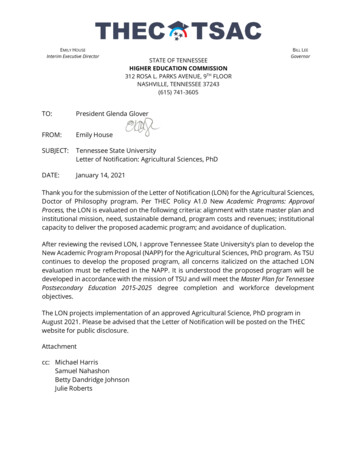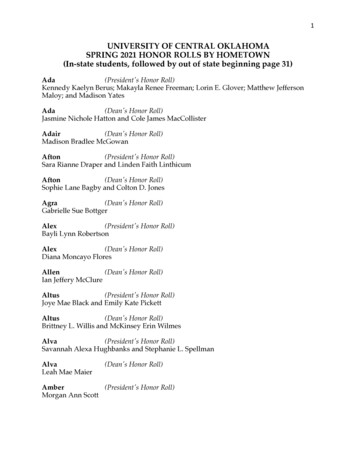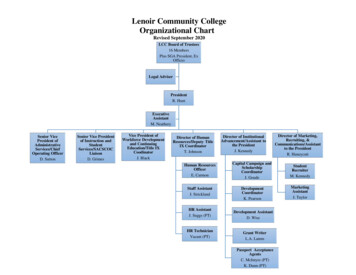
Transcription
EMILY HOUSEInterim Executive DirectorSTATE OF TENNESSEEHIGHER EDUCATION COMMISSION312 ROSA L. PARKS AVENUE, 9TH FLOORNASHVILLE, TENNESSEE 37243(615) 741-3605TO:President Glenda GloverFROM:Emily HouseSUBJECT:Tennessee State UniversityLetter of Notification: Agricultural Sciences, PhDDATE:January 14, 2021BILL LEEGovernorThank you for the submission of the Letter of Notification (LON) for the Agricultural Sciences,Doctor of Philosophy program. Per THEC Policy A1.0 New Academic Programs: ApprovalProcess, the LON is evaluated on the following criteria: alignment with state master plan andinstitutional mission, need, sustainable demand, program costs and revenues; institutionalcapacity to deliver the proposed academic program; and avoidance of duplication.After reviewing the revised LON, I approve Tennessee State University’s plan to develop theNew Academic Program Proposal (NAPP) for the Agricultural Sciences, PhD program. As TSUcontinues to develop the proposed program, all concerns italicized on the attached LONevaluation must be reflected in the NAPP. It is understood the proposed program will bedeveloped in accordance with the mission of TSU and will meet the Master Plan for TennesseePostsecondary Education 2015-2025 degree completion and workforce developmentobjectives.The LON projects implementation of an approved Agricultural Science, PhD program inAugust 2021. Please be advised that the Letter of Notification will be posted on the THECwebsite for public disclosure.Attachmentcc: Michael HarrisSamuel NahashonBetty Dandridge JohnsonJulie Roberts
Tennessee Higher Education CommissionLetter of Notification EvaluationJanuary 14, 2021The evaluation of the Letter of Notification (LON) is in accordance with the THEC Policy A1.0 NewAcademic Programs: Approval Process. The evaluation is conducted by interested parties and THECstaff. The LON is posted on the THEC website for a 15-day period of comment by interested parties.Based on the internal and external evaluation, THEC will make a determination to support, not tosupport, or defer a decision based on a revised LON.Institution: Tennessee State UniversityLON Submission Date: June 30, 2020LON Resubmission Date: December 18, 2020Academic Program, Degree Designation: Agricultural Sciences, Doctor of Philosophy (PhD)Proposed CIP Code/Title: 01.0000Agricultural/Animal/Plant/Veterinary Science and Related Fields, OtherProposed Implementation Date: August 2021Time Period Posted on Website for Public Comment: July 1 – July 16, 2020Note: Comments in italics within this document should be addressed in theNew Academic Program Proposal.CriteriaLetter of Support fromPresident/ChancellorOverall CommentsBackground onAcademic ProgramDevelopmentPurpose and Nature ofProgramComments A letter of support dated June 21, 2020 from President Glover wasincluded in the LON submission. The proposed program was approved by the TSU Board of Trusteeson March 12, 2020. The proposed PhD in Agricultural Sciences is intended to increasethe number and quality of graduate students prepared to tackleemerging issues in agriculture, including food safety and security,animal production and management, crop production, soil health,and water and air quality management. The proposed program advances TSU’s land-grant mission byemphasizing high research activity, community engagement, andstrong academic programs with a focus on student success. The Department of Agricultural and Environmental Sciences (DAES)proposes a PhD in Agricultural Sciences to advance competitiveresearch and instructional capacity. The impetus for the program comes from expressed job marketneeds of industry and government across rural and urbancommunities in the disciplines of animal science, food science, plantscience, environmental science, and agricultural education. DAES has grown in faculty, graduate students (about 80 mastersstudents), and has been awarded more United States Department ofAgriculture (USDA) food and agricultural research grants than anyother 1890 institution since 2010. The proposed program seeks to increase the number of minoritydoctoral degree holders in Agricultural Sciences by capitalizing onTennessee State UniversityAgricultural Sciences, PhDPage 2
Alignment with StateMaster Plan andInstitutional Mission Institutional Capacityto Deliver the ProposedProgram Existing programsoffered at public andprivate Tennesseeinstitutions TSU’s land grant mission and more than 25 million in annualresearch funding.United States Department of Agriculture (USDA) funds will supportthe proposed program by funding 18 students annually throughGraduate Research Assistantships.The proposed ASNR program will provide students with researchbased learning experiences focused on food safety, food security,environmental sustainability, and climate change.The proposed program may be delivered via a combination of onground and hybrid courses and will consist of 48 credit hours.As a result of a April 2019 graduate program review conducted byan independent reviewer (Dr. Mortimer Neufville), he made thefollowing recommendation: Create a separate Ph.D. degreeprogram in Agricultural Sciences because the current Ph.D. degreein biological sciences does not fully reflect the agricultural researchtraining received by these students.The proposed program aligns with state master plan for highereducation in the following areas:o Increasing the educational attainment levels of Tennesseanso Addressing the state’s economic development, workforcedevelopment, and research needso Ensuring increased degree production within the state’scapacity to support higher educationo Utilizing institutional mission differentiation to realizestatewide efficiencies through institutional collaborationand minimized redundancy in degree offerings, instructionallocations, and competitive research.The proposed PhD degree program in Agricultural Sciences isconsistent with the University’s mission to foster scholarly inquiryand research, lifelong learning, and a commitment to service. Theproposed degree program will further this mission by providing anew academic area for student development that involves bothbasic and applied research, practical coursework, and thesis-basedinquiry focused on agricultural issues that impact everyday lives ofTennesseans.The Department of Agricultural and Environmental Sciences hascapacity to support the proposed program with 48 faculty, 38 stateof-the art research laboratories across the main campus, threeresearch stations, and personnel working in 51 counties, and themajority of needed courses.Faculty will seek additional grant funding from the State ofTennessee, USDA, and other federal agencies to provide graduateassistantships to potential students.In the last four academic years, the department of Agricultural andEnvironmental Science has had an average of five PhD studentssince 2015-16 to 2018-19 academic years.Two programs are offered in Tennessee: UTK offers a PhD degree inthe specialized areas of food science, plant science and animalscience and TTU offers a PhD degree in environmental science witha concentration in the Agricultural Sciences.Tennessee State UniversityAgricultural Sciences, PhDPage 3
Student InterestLocal and regional needEmployerneed/demandFuture sustainableneed/demandProgramcosts/revenues andTHEC FinancialProjection Form If approved, this degree program will represent the only AgriculturalSciences PhD degree program in middle and west Tennessee.Feasibility Study Among the currently enrolled Ph.D. students with an agriculturalsciences background (N 14), 50 percent (N 7) indicated in a surveythat they want to move to the new PhD degree in AgriculturalSciences once it’s approved. Current students in the MS in Agricultural Sciences degree programat TSU were surveyed (N 56) and 73 percent (N 41) were interestedin the proposed program at TSU, if it were offered. From academic year 2015-16 through 2018-19, the Department ofAgricultural and Environmental Science graduated an average of 20MS students per year creating a potential pipeline for the proposedprogram. Between 2015 and 2019, an average of five agricultural sciencesstudents per year graduated with the PhD degree in BiologicalSciences. The Bureau of Labor Statistics finds that employment ofagricultural, food, animal, and soil and plant scientists andspecialists is expected to increase by 7 percent between 2018 and2028, which is faster than the average for all occupations. Please provide data that specifically supports the local and regionalneed (Nashville and Middle Tennessee) for the proposed PhD inAgricultural Sciences. The program will produce graduates with skills that contribute toagriculture and forestry, which comprises 10.3 percent of theworkforce in Tennessee. The U.S. Bureau of Labor Statistics (2017) projects that the marketdemand for scientists in the areas proposed in this degree programthat include food science, animal science, environmental science,plant science, and even agricultural science professors will increaseby 5-9 percent by the years 2024-2028 The BLS reports that Black or African Americans represent less than5 percent of the current workforce for agricultural andenvironmental sciences related fields. The program aims to producegraduates eligible for USDA and federal recruitment policies to alignthe ethnic, racial, and gender diversity of their workforce with that ofthe U.S. population. Letters of support were included from the United States Departmentof Agriculture (USDA), Aquafine, Tennessee Department ofEducation, University of Tennessee, Martin, Middle Tennessee StateUniversity, Tuskegee University, Austin Peay State University, ADM,The Tennessee Nursery and Landscape Association, Inc. and theTennessee Department of Education, As shown in the Financial Projection Form, funds have beenallocated to support .7 FTE of an Associate Professor with a basesalary of 85,000 and assuming an annual 2 percent increase. A total of 18 Graduate Research Assistantships will be awardedannually from external research grants. The graduate assistantTennessee State UniversityAgricultural Sciences, PhDPage 4
Public commentsnumbers on the THEC Financial Projections form do not align with thetext – please reconcile. Revenue will be generated from student tuition and fees and federalgrants with projections showing a net gain from year one forward. Enrollment projections estimate 13 students in year one and 29students annually after year four. Public Comments were received from Middle Tennessee StateUniversity and the University of Tennessee Institute of Agricultureand are included in Appendix A.Tennessee State UniversityAgricultural Sciences, PhDPage 5
Appendix ATennessee State UniversityAgricultural Sciences, PhDPage 6
Tennessee State UniversityAgricultural Sciences, PhDPage 7
TENNESSEE STATE UNIVERSITYDEPARTMENT OF AGRICULTURAL AND ENVIRONMENTAL SCIENCESLON: TO ESTABLISH A Ph.D. DEGREE IN AGRICULTURAL SCIENCESResponse to Comments from THEC and the Public1. THEC requests clarifications outlined below:a. Provide information related to local and regional demand for the proposed program.b. Conduct a survey to provide student interest related to the proposed program.c. Clarification regarding the inclusion of natural resources in the program title and thecomposition of the proposed concentrations is requested especially with the focus onagriculture education.Response:a. Additional information on local and regional demand for the proposed Ph.D. degreeprogram was added to the proposal and also presented as Table 1-5, and narrative on page11-16 of the revised LON. Letters of support from Federal, State and Industry partnersare now included as appendix I in pages 21-32 of the revised LON.b. A survey on student interest was conducted September-November, 2020, and is presentedin Tables 1 and 2 and narrative on Pages 11 and 13 of the revised LON.c. The input from the THEC and public review of the LON was discussed with faculty anddecision was reached to propose developing a Ph.D. degree program in AgriculturalSciences without concentrations. This change is nor reflected in the entire revised LON.2. Overall Commentsa. The proposed program and associated concentrations do not seem to have a naturalresources component – also see comments from MTSU. Please clarify where the NaturalResources component will be included in the proposed program. This may also require aCIP code revision.Response: The input from the THEC and public review of the LON was discussed withfaculty and decision was reached to propose developing a Ph.D. degree program inAgricultural Sciences without concentrations. The CIP code was revised to 01.0000.b. The CIP code title for 01.9999 is Agricultural/Animal/Plant/Veterinary Science andRelated Fields, Other and not Agricultural Sciences and Natural Resources as referencedon page 3 of the LON.Response: The proposed Ph.D. degree is in Agricultural Sciences with the CIP code01.0000.c. The LON focuses on the lack of Agricultural Education as a key need in PhD levelcoursework, but this is only one of the concentrations. How will the proposed programsupport this objective?1
Response: The proposed Ph.D. degree in Agricultural Sciences does not haveconcentrations.d. Conduct a survey to provide student interest from current students and/or recentgraduates from the Agriculture Science MS program.Response: A survey was conducted on current graduate students (MS and Ph.D.) andrecent graduates of the same programs at Tennessee State University. Additional surveyswere conducted at other universities within Tennessee and other states. These surveyswere conducted in September-November, 2020 and the outcome of the survey is includedin the revised LON in Table 1 and narrative page 11 of the revised LON.e. Resubmit the LON as one complete document that includes the letters of support.Response: The LON now includes the proposal and the letters of support as onedocument. The letters of support are included as appendix I on pages 21-32 of the revisedLON.3. Purpose and Nature of Programa. The proposed program will consist of 48 credit hours and have concentrations in AnimalScience, Food Science, Plant Science, Environmental Science, and AgricultureEducation. Will the proposed program have enough enrollment to support fiveconcentrations?Response: The scope of the Ph.D. degree has been revised to a Ph.D. degree inAgricultural Sciences which does not have concentrations. Therefore there will be noproblem in meeting the enrollment goal.b. The proposed program may be delivered via on ground or blended. Provide anexplanation of blended as a delivery method.Response: The term “blended” was changed to “Hybrid” implying that some coursesmay be taught both on-ground and online (Page 5 of the revised LON).c. Will all courses be created for on-ground and blended delivery? If not, how will youdifferentiate which courses will use which delivery method?Response: All courses will be taught on-ground while some will taught as hybridimplying on-ground and on-line to accommodate working and non-traditional students.(Page 5 of the revised LON).d. The LON mentions students were surveyed and about half preferred full-time and theother half part-time. Will students be able to attend part-time and if so, will they beeligible for graduate assistantships?2
Response: Only full-time students will be eligible for the graduate researchassistantships.e. The LON states “As a result, the April 2019 graduate program review conducted by anindependent reviewer (Dr. Mortimer Neufville) made the following recommendation:Create a separate Ph.D. degree program in Agricultural Sciences and Natural Resourcesbecause the current Ph.D. degree in biological sciences does not fully reflect theagricultural research training received by these students;” which program review wasthis? Please include this review in the appendix.Response: The graduate program review report is attached as Appendix IV, pages 37-50of the revised LON.4. Alignment with State Master Plan and Institutional MissionUtilizing institutional mission differentiation to realize statewide efficiencies throughinstitutional collaboration and minimized redundancy in degree offerings, instructionallocations, and competitive research – This last bullet point specifically mentionscollaboration however the supporting language does not address this – please adjust.Also, the LON states the differentiation in programming will come from AgricultureEducation, but this is one of five concentrations, three of which (animal science, plantscience, and food science) are already being offered at UTK. Please provide additionalinformation concerning how this program will ensure differentiation.Response: This section was revised to point to the fact that (1) if approved, TSU’s Ph.D.degree in Agricultural Sciences will provide the only dissertation-based Ph.D. degree inAgricultural Sciences that has a focus on holistic approach to agricultural issues inTennessee; this is reflected in the curriculum of the proposed degree (Appendix II, page33-34, Table 6 of the revised LON) and (2) Tennessee State University is known toproduce the largest number of minority graduates in the state and this degree programprovides minority students an option to pursue a doctoral degree in agricultural sciencesat an institution of their choice (page 8 of the revised LON).5. Institutional Capacity to Deliver the Proposed Programa. In the last four academic years, the department of Agricultural and EnvironmentalScience has had an average of five PhD students since 2015-16 to 2018-19 academicyears. How will the proposed degree impact the existing Biological Sciences, PhD degreeprogram (refer to Table 1)?Response: The proposed Ph.D. degree in Agricultural sciences will not adversely affectthe Ph.D. degree program in biological sciences. The survey of current and past Ph.D.students has demonstrated that about 50-60% of these students would be interested inpursuing a Ph.D. degree in Agricultural Sciences, leaving the rest of the students in thePh.D. degree program in biological sciences. Additional students will be recruited intoboth of these programs to ensure these programs meet their enrollment and graduation3
benchmarks.b. Please provide a course comparison between the proposed program and the PhD degreein Biological Sciences.Response: The course comparison between the proposed Ph.D. degree in agriculturalsciences and the Ph.D. degree in Biological Sciences is presented as Appendix II, page33-34, Table 6 of the revised LON.6. Student Interesta. In a survey of Tennessee extension educators and secondary agriculture teachers (n 192),48 percent plan to pursue a doctorate degree and 86.5 (n 83) percent of those would beinterested pursuing a doctorate at TSU. This survey was only focused on the AgricultureEducation concentration. Please provide student interest for the other concentrationsand/or the proposed program as a whole. A survey of current MS students would behelpful as a potential pipeline into the proposed program.Response: A comprehensive survey was conducted to assess student interest in theproposed Ph.D. degree program. The survey was inclusive of all potential students,current MS students in the Department of Agricultural and Environmental Sciences, thePh.D. degree program in Biological Sciences. The survey was also inclusive of potentialstudents from other institutions within the state of Tennessee and the nation. This newsurvey was based on the interest of the revised focus Ph.D. degree in AgriculturalSciences. This updated survey is in Table 1 and narrative on pages 10-11 of the revisedLON.b. In a survey of currently enrolled PhD students within agricultural sciences, all indicatedthey would move to the new degree in Agricultural Sciences and Natural Resources ifapproved. How many students does this represent? Please specify the PhD programs thatwere surveyed.Response: The PhD degree program in the biological sciences usually comprises onaverage 25 students per year. Eleven (11) students have completed or in the process ofcompleting the degrees this fall 2020 semester. The remaining 14 students who arecontinuing with the program were surveyed.Local and regional need Please provide data that specifically supports the local and regional need for theproposed PhD in Agricultural Sciences and Natural Resources.Response: Additional data and accompanying narrative has been added to the LON(pages 11-16 of the revised LON). The data demonstrates high demand for the Ph.D.degree in Agricultural Sciences nationally and locally or within the State of Tennessee.4
7. Future sustainable need/demand Many of the letters of support are from individuals interested in enrolling in the programor from employers that express support for the development of the program. However,none of the letters of support show an interest in employing graduates from the proposedprogram or collaborating on dissertation research. Please provide letters that supportemployment and research collaboration.d. Response: Letters of support which demonstrate support for the proposed degreeprogram through research collaborations and potential for employment of graduates arenow included as appendix I on pages 21-32 of the revised LON.Public comments Please provide a response to concerns raised in the public comment from MTSU relatedto the proposed program name Agriculture Sciences and Natural Resources.Response: The degree name was changed to “Ph.D. in Agricultural Sciences”5
Letter of Notification (LON)Policy A1.0 New Academic Programs: Approval ProcessInstitution:Tennessee State UniversityProposed Academic Program:Ph. D, Agricultural SciencesProposed Implementation Date:August 2021CIP Code:01.0000CIP Code Title and Definition:Agricultural SciencesThe Department of Agricultural and Environmental Sciences, in the College of Agriculture, TennesseeState University, is proposing to establish a new Ph.D. degree program in Agricultural Sciences. Theprogram focuses on the application of original research/scholarship to solve grand challenges facing thefield of agriculture during this time when our climate is changing rapidly, human population is growing,and technologies in the biological, engineering, and digital fields are evolving rapidly. Through theagricultural sciences Ph.D. degree students will learn how to employ research-based solutions in theagricultural areas of animal production, food safety and product development, biotechnology applicationsin the plant and food sciences, and environmental stewardship. The program is also designed to betterprepare our future agricultural workforce. It provides an educational experience that builds on alreadyacquired knowledge of the Agricultural Sciences to the mastery of the application of scientific research tosolve problems in agriculture and to prepare students for successful careers in teaching, research, andoutreach. Overall, the program will develop successful researchers, scholars, and both instructional andoutreach personnel in the agricultural and related sciences; they will effectively serve in academia,government, and the private sector.LON Submission Date: June 29, 2020Posted Date on THEC Website: July 1, 2020Public Comment Period: July 1-July 16, 2020Letter of Notification ChecklistTHEC Academic Policy 1.0 (Section 1.0.6A) Letter of Notification Requirements Letter of Support from the President/Chancellor signifying institutional governingboard or system office support for development; Program name, degree designation and CIP code; Proposed implementation date; Academic Program Liaison (APL) name and contact information; Purpose and Nature of Program; Alignment with state master plan and institutional mission; Feasibility Study; Program Costs/Revenues; and Existing Programs Offered at Public and Private Tennessee Institutions.1
Table of ContentsLetter of NotificationProgram Name, Degree Designation and CIP Code . 3Proposed Implementation Date . 3Academic Program Liaison Name and Contact Information . 3Background Concerning Academic Program Development . 3Purpose and Nature of Program . . 4Alignment with State Master Plan and Institutional Mission . 6Institutional Capacity to Deliver the Proposed Program . . 8Feasibility Study . 9Student Interest for the Proposed Academic Program .10Current Graduation Trends in the DAES at TSU .11Local and Regional Demand for the Proposed Academic Program . 11Employer Need and Demand . 12Future Sustainable Need and Demand . 16Existing Programs Offered at Public and Private Tennessee Institutions . 17Program Costs/Revenues . . 17References . 19Appendix I: Letters of support .20Appendix II: Course Comparison between the proposed Ph.D., degree in AgriculturalSciences and the Ph.D. degree in Biological Sciences . .33Appendix III: Financial Projections .35Appendix IV: Graduate program Review (2019) 372
Letter of Notification Proposal for a Ph.D. Degree in Agricultural SciencesRE:New Academic ProgramAcademic Program Name:Agricultural SciencesDegree Designation:Ph.D.Proposed CIP Code:01.0000CIP Code Title:Agricultural SciencesProposed Implementation Date:August 2021Academic Program Liaison:Samuel Nahashon, Ph.D.Professor and Department Chair of Agricultural andEnvironmental SciencesTennessee State University3500 John A. Merritt Blvd.Nashville, TN 37209-1561(615) 963-5829snahashon@tnstate.eduBackground Concerning Academic Program Development: Since 2010, the Department ofAgricultural and Environmental Sciences (DAES) has built both research and instructionalcapacity in Agricultural Sciences. The department has grown in faculty numbers, graduate students(about 80 MS students), and funded research by several fold during this period. In fact, the UnitedStates Department of Agriculture (USDA)- National Institute of Food and Agriculture (NIFA) hasrecently published a document demonstrating that Tennessee State University (TSU) has been themost successful institution in garnering competitive food and agricultural research grants amongthe nineteen 1890 Land Grant institutions every year since 2010. Furthermore, a just-concluded2020 report on the participation of the 1890 Land Grant Universities in competitive fundingprograms cites further evidence that the TSU College of Agriculture, has the largest share of theUSDA-NIFA funding portfolio, part of which supports the graduate program. The DAES houses48 outstanding faculty in the College of Agriculture, who are fully engaged in cutting-edgeextramural funded research in the disciplines of food safety and product development, animal andplant sciences, environmental remediation, biotechnological advancements in the agriculturalsciences, and commerce. These faculty utilize their expertise to also provide outstandingeducational programs to prepare the future agricultural workforce. Faculty researchers have beenworking with, and addressing the needs of, graduate and undergraduate students, industry andgovernment, rural and urban communities, and the feedback from these stakeholders has led us toinitiate this letter of notification to initiate a new Ph.D. degree program in the AgriculturalSciences. Currently, our BS and MS graduates look to other schools to pursue Ph.D. degrees.Some, very hesitantly pursue the Ph.D. degree in Biological Sciences at Tennessee StateUniversity. However, the degree in Biological Sciences does not meet the job market needs in the3
Agricultural Sciences disciplines of food, animal, plants, and environmental sciences. Thismessage has been clearly communicated to the faculty by both students and employers.All the currently enrolled Ph.D. students with agricultural sciences background have indicated thatthey want to move to the new Ph.D. degree in Agricultural Sciences once it is approved. Inaddition, a needs assessment was conducted (N 202) which indicates greater demand (64%) forthe program from graduate students. A survey of secondary and post-secondary agricultureeducators, government workers and industry representatives (N 80) was conducted. A majority ofrespondents (65%) stated they were ready to start the Ph.D. degree program once it is approved.A more detailed assessment of demand for the proposed Ph.D. degree program is presented asTable 1 in the Feasibility Study under Student Interest.Purpose and Nature of Program: The Department of Agricultural and Environmental Sciencesat Tennessee State University herewith submits to the Tennessee Higher Education Commission(THEC) a Letter of Notification (LON) for a Doctor of Philosophy Degree Program in AgriculturalSciences. The request to establish this degree program is timely, and based on solid evidence thatthe program will address the needs of the Tennessee labor market and exceeds the minimumthreshold for degree requirements set by the THEC. The following items are presented todemonstrate validity of the program:1. The number of minority doctoral degree holders in the Agricultural Sciences, especially inthe State of Tennessee, is very low. Tennessee State University, being an 1890 Land Grantinstitution, has a history of producing a large number of minority Master’s Degree holdersin Agricultural Sciences. In fact, we currently have the largest agricultural MS programamong the HBCU institutions. Thus, the Ph.D. degree in Agricultural Sciences would alsoincrease the number of minority doctoral graduates in the Agricultural Science and at thesame time enable TSU t
Tennessee State University Agricultural Sciences, PhD Page 2 Tennessee Higher Education Commission Letter of Notification Evaluation January 14, 2021 The evaluation of the Letter of Notification (LON) is in accordance with the THEC Policy A1.0 New Academic Programs: Approval Process. The evaluation is conducted by interested parties and THEC





![WELCOME [ montclair.edu]](/img/31/commencement-program-2022.jpg)




